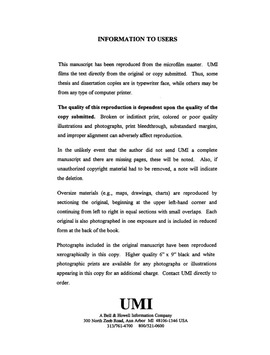| dc.contributor.advisor | Shalhope, Robert, | en_US |
| dc.contributor.author | Lively, Robert John. | en_US |
| dc.date.accessioned | 2013-08-16T12:30:25Z | |
| dc.date.available | 2013-08-16T12:30:25Z | |
| dc.date.issued | 1998 | en_US |
| dc.identifier.uri | https://hdl.handle.net/11244/5761 | |
| dc.description.abstract | In the British colony of New Brunswick, the period from 1837 to 1857 was one of intense political reform. The reform movement which eventually produced Responsible Government was the creation of a small group of men who were participants in an Anglo-American political discourse stretching back to the seventeenth-century. Those men consciously drew on the ideas and values of transatlantic political culture to fashion their own political persuasion. That persuasion, best reflected in the public rhetoric of the reformers, represented a middle path between British and American traditions, as well as between liberal and democratic ideals. | en_US |
| dc.description.abstract | By the time the Confederation debate finally pushed all other political issues to the margins, New Brunswick's liberal reformers had not only substantially reformed the political system but had laid the foundations of a new liberal-democratic political culture. This study is an attempt to understand a part of the history of Canadian political culture, the ideas, attitudes and emotions that are the foundation of the modern Canadian political system. | en_US |
| dc.description.abstract | New Brunswick's first liberal reformers sought the golden mean between oligarchy and democracy. Their battles were primarily against the entrenched privilege and prerogatives of the family compact, but they were equally wary of excessive of democracy. They saw in Responsible Government the balance they were seeking. Through Responsible Government they eventually gained a substantial measure of autonomy and a more effective and efficient political structure. In addition, reformers successfully battled for reform of the electoral system, religious freedom, educational reform and moral reforms such as temperance. | en_US |
| dc.description.abstract | At the center of the reform persuasion was a type of constitutional liberalism incorporating principles of autonomy, popular sovereignty, social justice and progress. In its international context that type of liberalism was very similar to the liberalism then developing in the other British North American colonies, and had much in common with British liberalism as well as the newly emerging culture of the American Whigs. With roots in classical republican, classical liberal, and Scottish political thought, this persuasion was also strongly influenced by the values of evangelical Protestantism. This study is not however, concerned with roots as much as with the actual conditions of political thought and the ways in which reformers utilized certain ideals and values to resolve the political problems that they faced. | en_US |
| dc.format.extent | x, 236 leaves ; | en_US |
| dc.subject | Political Science, General. | en_US |
| dc.subject | New Brunswick History 19th century. | en_US |
| dc.subject | History, Canadian. | en_US |
| dc.subject | New Brunswick Politics and government 19th century. | en_US |
| dc.title | Loyalist to liberal: The reform persuasion in New Brunswick politics, 1837-1857. | en_US |
| dc.type | Thesis | en_US |
| dc.thesis.degree | Ph.D. | en_US |
| dc.thesis.degreeDiscipline | Department of History | en_US |
| dc.note | Adviser: Robert Shalhope. | en_US |
| dc.note | Source: Dissertation Abstracts International, Volume: 59-12, Section: A, page: 4505. | en_US |
| ou.identifier | (UMI)AAI9914414 | en_US |
| ou.group | College of Arts and Sciences::Department of History | |
